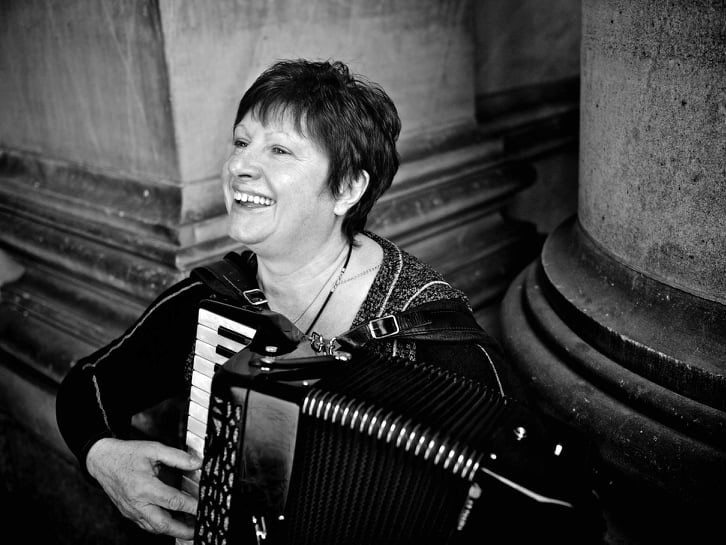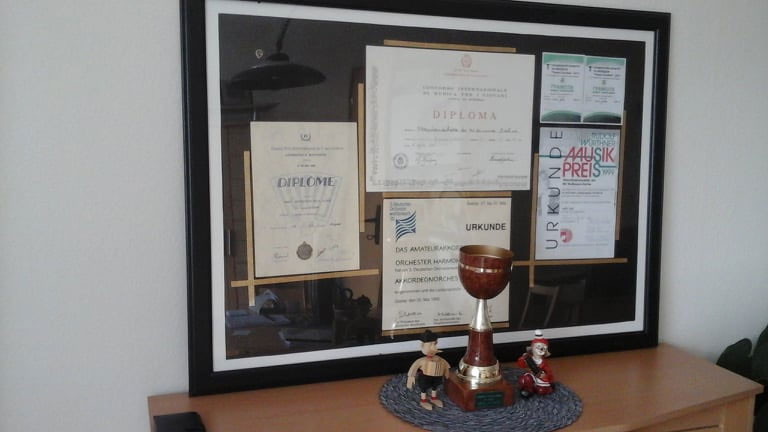"I train my students for the stage and then I enjoy their success. I am rarely a soloist myself, but to this day I continue improving my skills. Family has always been the most important thing to me." This is how Gergana Wlatschkov describes her life, passing between work in Germany and vacations at home. She has more than 30 years of experience as conductor of accordion orchestras at several music schools in Berlin. She is winner of prestigious German awards and her graduates have won international awards in France, Italy and other countries. A distinctive feature of all the ensembles she has led is that they are great in performing Bulgarian music, including classical plays and folklore arrangements.
She left for Germany together with her husband – renowned trumpeter Kiril Wlatschkov. The two met on a tour as Gergana was part of the vocal trio "Obektiv" and her future husband was part of the orchestra. She says she inherited the talent from her father, who used to be a musician in the Air Force Brass Band.
"My first contacts with the music happened thanks to him," Gergana says. “I still remember the concerts that the orchestra held in Borisova Gradina, or in the Military Club. My father saw that I had a gift and at the age of 10 he took me to the Palace of the Pioneers. I started taking accordion lessons, which I did not learn much from, but a year later I joined the accordion orchestra and music became my destiny. In the National Academy of Music I studied under Georgi Galabov - a unique person and teacher to whom I owe a lot."

The musician became part of “Obektiv Trio” by accident. Her friend singer Margarita Gradeva met her with Nikolay Kuyumdzhiev – composer, arranger and creator of the band, who at that time was looking for a singer. Concerts, trips, and recordings followed.
"There were many good moments, interesting and exciting, but this was not my world. I don't like to travel much; I missed my family,” she recalls. She got married, left the trio, and soon after her son was born, she started teaching in a community center in Sofia.
"Georgi Galabov, my teacher, asked me if I would help four children prepare for the end of the school year. I agreed and later in September I already had a huge class. There have always been people in my life who gave me a helping hand. In Germany I haven’t had any obstacles, too. There, if a person really wants to work and has something to show, they will receive support. Ensemble performance has many specific characteristics that I am well acquainted with and this proved to be my strength. I have earned respect as conductor and arranger of an accordion orchestra. I have won quite a few awards. I am the winner of the prestigious Silber Dirigentstock of Harmonika Verband Deutschland.

I have also had very good students. After the Unification of Germany, we took part in an international music contest in France. As far as I know, we were the first East Berlin accordion orchestra to go abroad and receive an award. Later, we were sent as representatives of Berlin to the prestigious All-German Festival of Amateur Ensembles. We took part in a contest in Italy and also returned with an award."
"I have had a total of seven permanent formations and spent more than 25 years in D'Akkord. It still exists today, led by one of my students. We have had concerts in France, Belgium, Moldova, and several times in Bulgaria. D’Akkord is very popular in Berlin. I have worked only according to the methods of the Bulgarian accordion school and I owe part of my success to this.”
In recent years Gergana has been staying in Bulgaria for longer periods of time.
"I continue to be interested in the problems of music training in different countries. I also spent each summer in my country house in Bulgaria. I play in the evening and people are very happy when they hear me. A neighbor says he pours himself a glass of rakia, opens the window and starts listening to me. People pass by and talk about the music.
In Germany I am a very good and always welcomed guest. People there treat me with a lot of warmth and respect. But there is something that cannot be changed – your true place is where you were born.”
English: Alexander Markov
Photos: private libraryPenka Petrosovitch is a music teacher as professional career began at the Music School in her hometown of Burgas . She also achieved success as a choir conductor – initially with the school’s choir and orchestra, and then with the folklore ensemble..
Violinist Svetlin Roussev – one of the brightest instrumentalists on the planet at the moment, a charismatic artist with enviable intelligence, impressive sound culture and amazing ease in communication, was in Sofia on March 13 for a..
Bayse Kasimlarli is a primary school teacher. She is one of those pedagogues for whom working with children is not just a profession, but a calling. She says that the little ones give her strength and energy, and she puts her whole soul and heart into..

+359 2 9336 661
